Dyslexia Awareness Dashboard: All our Dyslexia posts and references in one place to help us all better serve youth with dyslexia
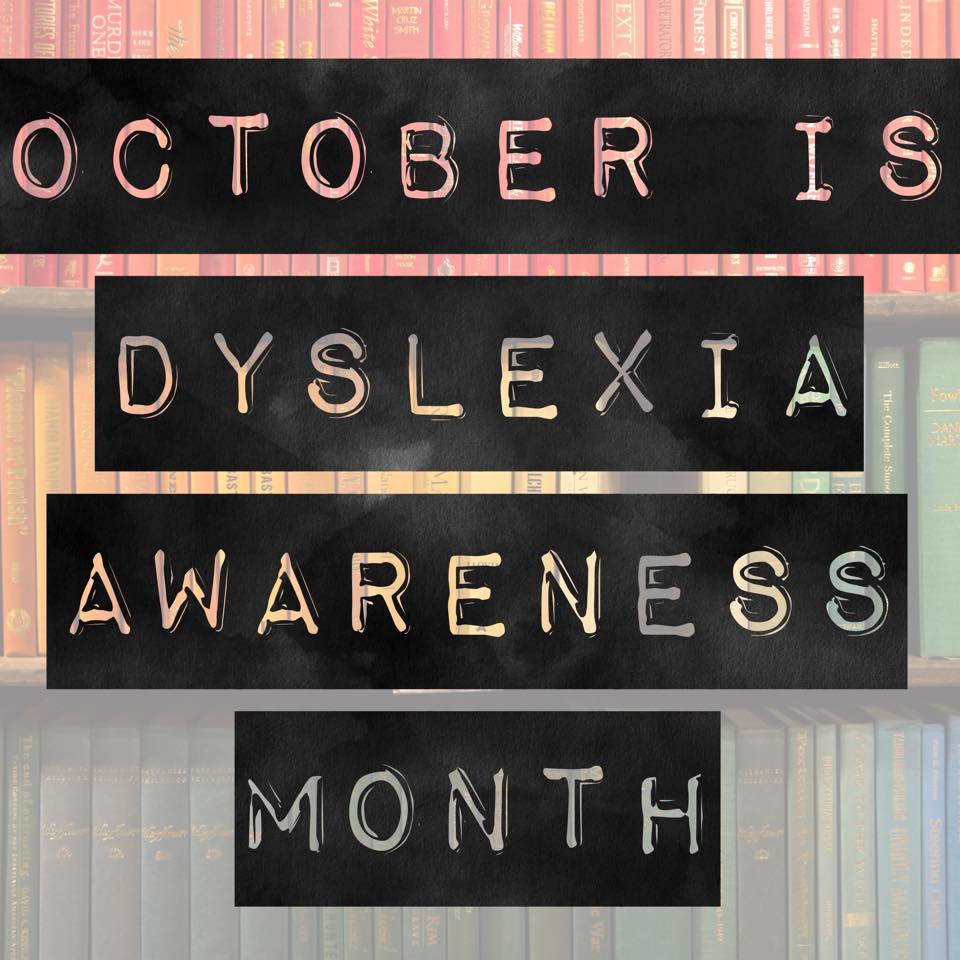
My Journey Parenting a Child with Dyslexia
Here are the articles I have written as both a librarian and the mother of a child with dyslexia in which I share my personal journey of learning how to better understand, advocate for and help my child with dyslexia. Every day I’m learning more about how to better understand and help my child and children like her. I hope you will join me on this journey because if we want to raise readers, we need to understand that not everyone learns to read in the same way and at the same time. And if I could say one important thing to you it is this: never ever shame a person on their reading journey, no matter where they are at, what they are reading, or how it may differ from yours.

Being a Librarian Did Not Prepare Me for Parenting a Child with Dyslexia
How Misuse of the 40 Book Challenge Made My Dyslexic Child Hate Reading and Why I Pushed Back
Middle Grade Graphic Novels That a Middle Grade Reader with Dyslexia Really Loves
So You Want to Raise a Reader? I Have Some Tips for You
In Which I Interview Thing 2, My Child Who Has Dyslexia (She wrote some of the questions herself)
Everything You Need to Know About Dyslexia and Library Services to Youth with Dyslexia at TLT
October is Dyslexia Awareness Month, so let’s get started
How Libraries Can Better Serve Youth with Dyslexia, an Infographic
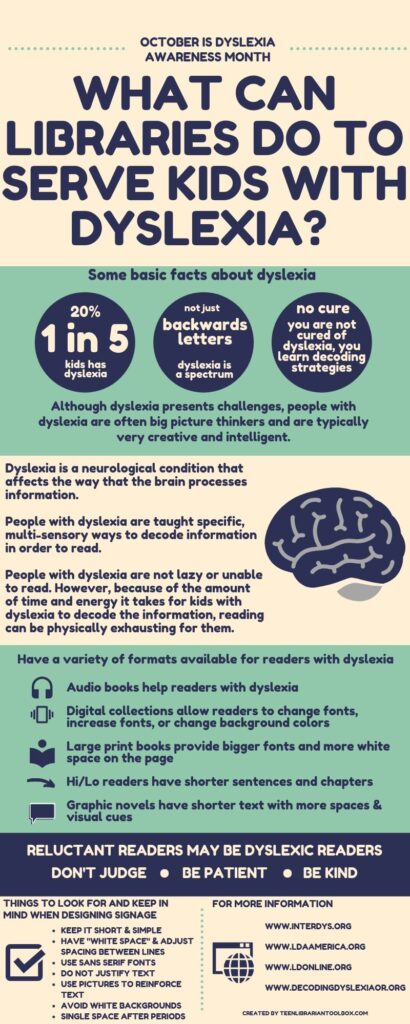
Dyslexia Awareness Month: Providing a Variety of Formats is an Access Issue
Additional Posts About Dyslexia at TLT
What if it’s more than Reluctant Reading
Books Featuring Main Characters with Dyslexia, a discussion and a book list
Dyslexia from a Teen POV, a guest post
What are libraries doing for Dyslexia Awareness Month? Here are a few examples
Dyslexia Awareness Month: Tips from an Educator on Helping Students with Dyslexia Succeed
Dyslexia Awareness Month: Dyslexic—and Bilingual? a guest post by Laura Rueckert
Dyslexia Awareness Month: Dyslexia from a Teen POV, a guest post by teen blogger Lauren
Princesses Can Have Dyslexia Too
Library Services to Youth with Dyslexia Guidelines and Examples
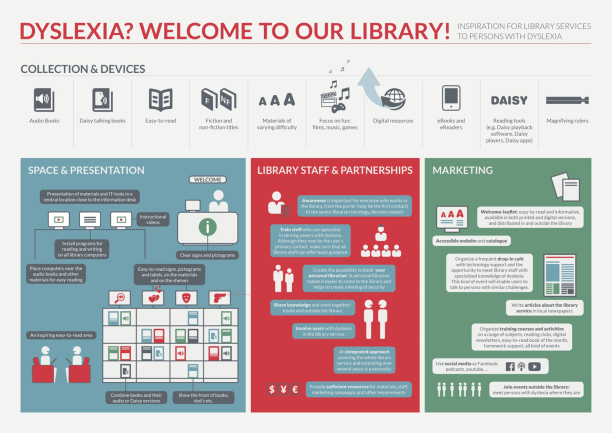
Upper Arlington in Ohio services to children with dyslexia
IFLA has some great discussion about services to patrons with dyslexia as well
ALSC guidelines for library services to children with dyslexia
An interview with The Dylslexic Librarian
Dyslexia Organizations, Dyslexia 101 and Designing for Dyslexia
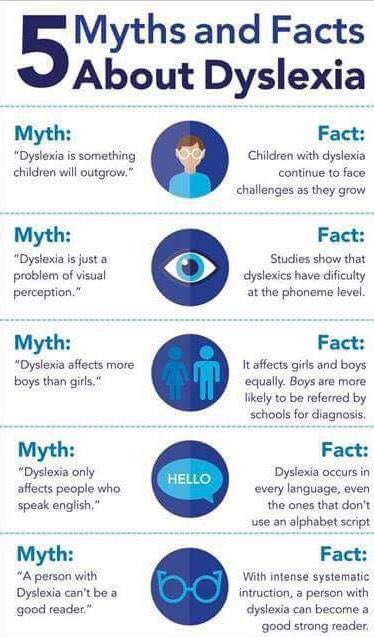
Resources to learn more about the basics of dyslexia and how to better serve youth with dyslexia. Many of these websites have helpful infographics and design tips that we should keep in mind when designing our signage, flyers, etc.
ADVERTISEMENT
ADVERTISEMENT
CNN: This is what reading is like if you have dyslexia
International Dyslexia Association
Dyslexia Affects More Than Just Reading, here’s a look at other skills that can be affected by dyslexia
DITC: Dyslexia in the Classroom, what every teacher needs to know
Dyslexia Accommodations in the Classroom – please don’t ask students to read aloud, don’t count off for poor spelling, don’t insist on book levels, don’t make book levels public knowledge if you use them, and consider letting students take photos of notes on the board or provide printed out copies of notes. These are just a few of the accommodations that are suggested to help youth with dyslexia be successful in school. A quick Google search will lead you to many more resources about this important topic.
Dyslexia and High School Drop Out Rates – Undiagnosed dyslexia, self-esteem issues and an unsupportive learning environment or lack of resources can lead to a higher drop out rate for students with dyslexia. It is imperative that we advocate for early diagnosis and proper educational support and that our youth with dyslexia are given proper instruction in order for them to be successful.
Scholastic: Dyslexia, what teachers need to know
Dyslexia, what you’re seeing in your high schooler
F is for Fail – this article is from Canada, but it touches on some important points. One of our biggest measures of academic success is whether or not a child can read at level in the 3rd grade. However, schools don’t typically test for dyslexia until the second semester of their 2nd grade year. At this time, it’s often too late for proper intervention. We need routines screening beginning the moment our kids start school to help get them and keep them on track.
Dyslexic Library – a blog by a mother and daughter
Social and Emotional Problems Related to Dyslexia – want to better understand what it’s like to have dyslexia? This article really helped me better understand that anxiety and self-doubt that can come from having a brain that thinks differently in our world.
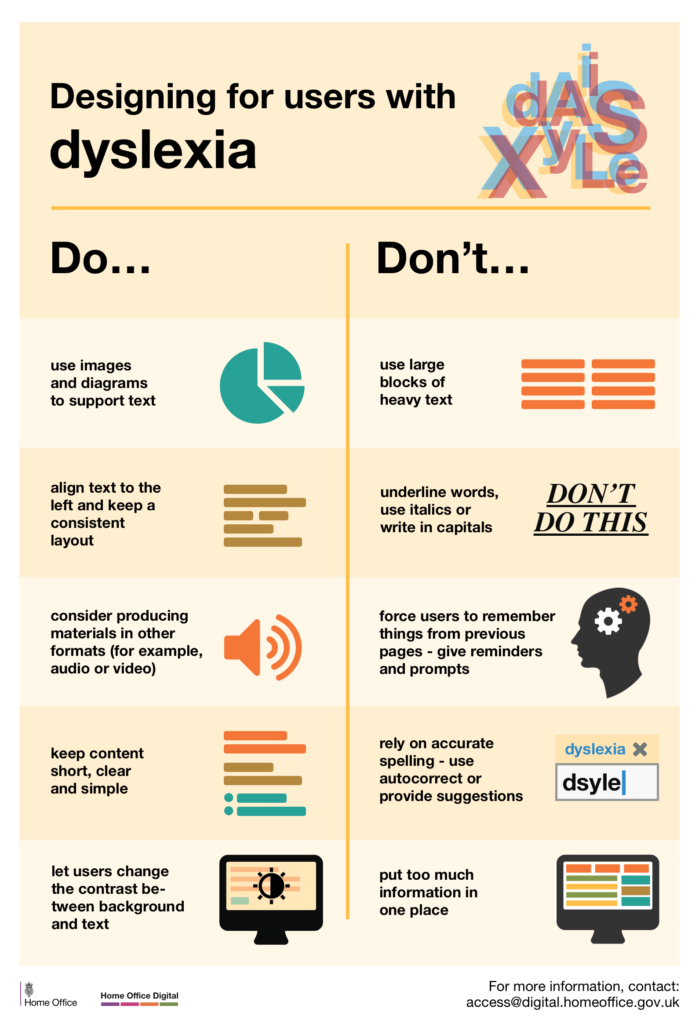
6 Surprising Bad Design Practices that Hurt Dyslexic Users
What to Look for in Books
What makes a book dyslexia-friendly?
Scholastic Acorn and Branches books are a great resource for readers grades K-3. Also look at graphic novels and audio books, especially for readers grades 3-7. Graphic novels, audio books and hi-lo readers like those published by Orca are great for high school readers with dyslexia. Many people have also suggested decodable books. Digital media is a great resource for readers with dyslexia and tools like Overdrive allow readers to personalize their tools in ways that work best for them.
When recommending books to readers with dyslexia, consider the following:
Shorter is better – shorter words, sentences, and paragraphs help prevent the blurring of text.
Bigger is better – bigger text can help prevent the blurring of text as well
Sans-Serif fonts – many people with dyslexia find san-serif fonts easier to read
More “white space” on the page – having more white space, or negative space with no text at all, on the page is helpful
But not actual white space – black text on a stark white background is often the most difficult to read, using an off white page can be helpful for many readers with dyslexia
To the left, to the left – Left justify your text for easier reading
Simple is better – Whatever you can do to simplify your text is better. Use bold lettering instead of italics, for example. Don’t add a lot of flourishes and fancy stuff. You want to make it as easy to read as possible so that readers with dyslexia have less opportunities to mix up letters and words, skip lines or paragraphs, etc.
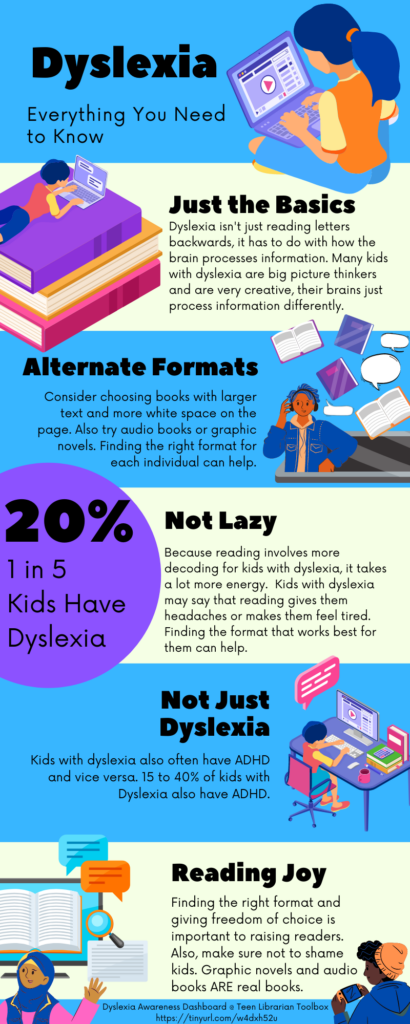
Filed under: Dyslexia
About Karen Jensen, MLS
Karen Jensen has been a Teen Services Librarian for almost 30 years. She created TLT in 2011 and is the co-editor of The Whole Library Handbook: Teen Services with Heather Booth (ALA Editions, 2014).
ADVERTISEMENT
ADVERTISEMENT
SLJ Blog Network
Happy Poem in Your Pocket Day!
This Q&A is Going Exactly As Planned: A Talk with Tao Nyeu About Her Latest Book
More Geronimo Stilton Graphic Novels Coming from Papercutz | News
Parsing Religion in Public Schools
ADVERTISEMENT




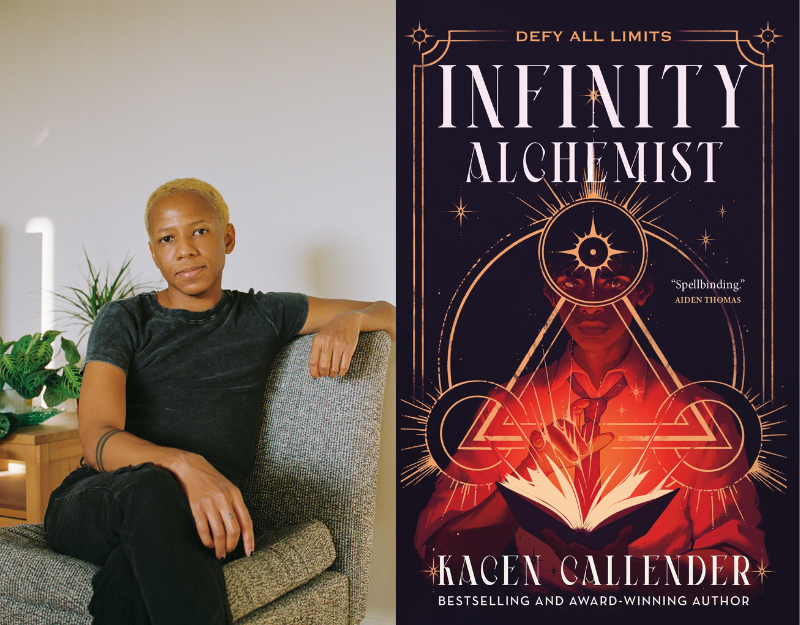
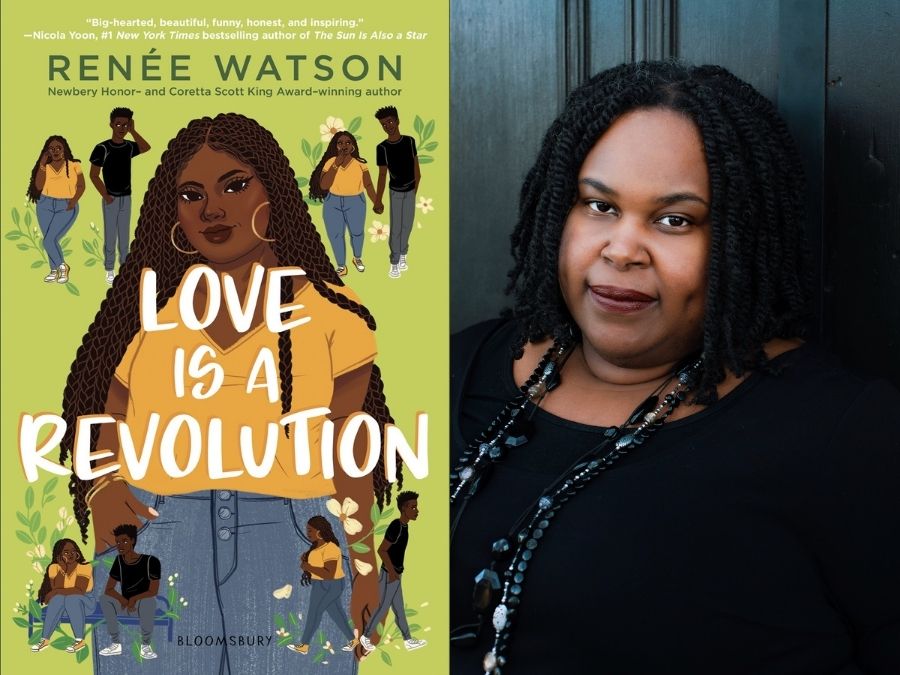
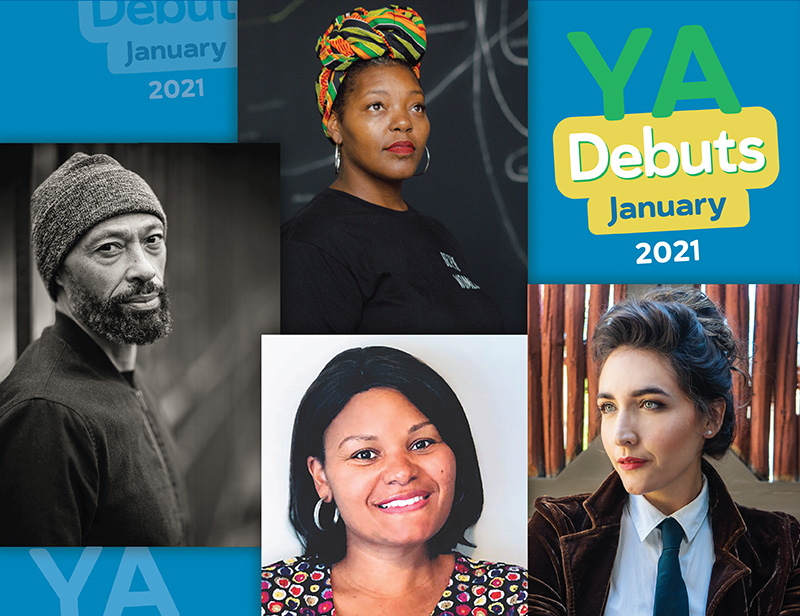
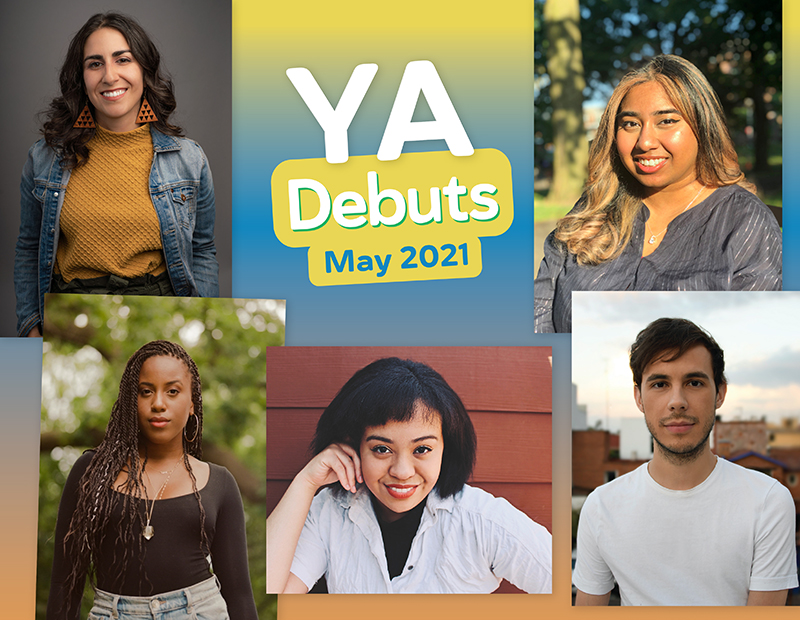
Karen, I love all of the infographics you have here! I have a loved one who has dyslexia and I read and listened to The Dyslexic Advantage. This was the best nonfiction book I have had the privilege of reading in a long while! It helped me to understand the person with dyslexia as a whole and it can be a great confidence booster for those struggling with this challenge. I HIGHLY recommend it!
It is available on the Hoopla app with your library card!
Best!